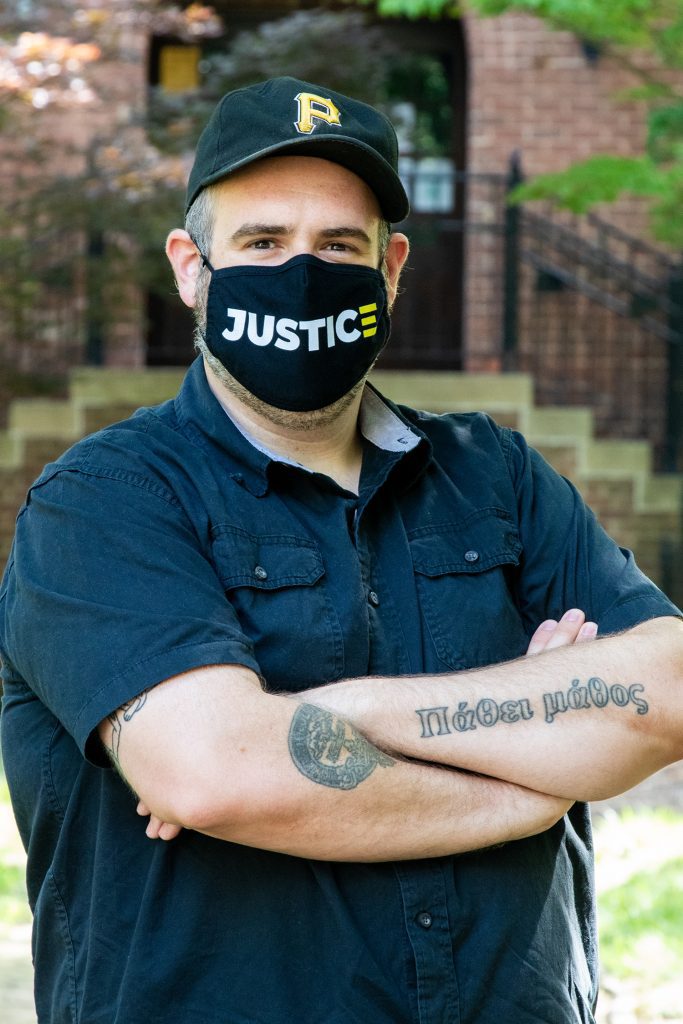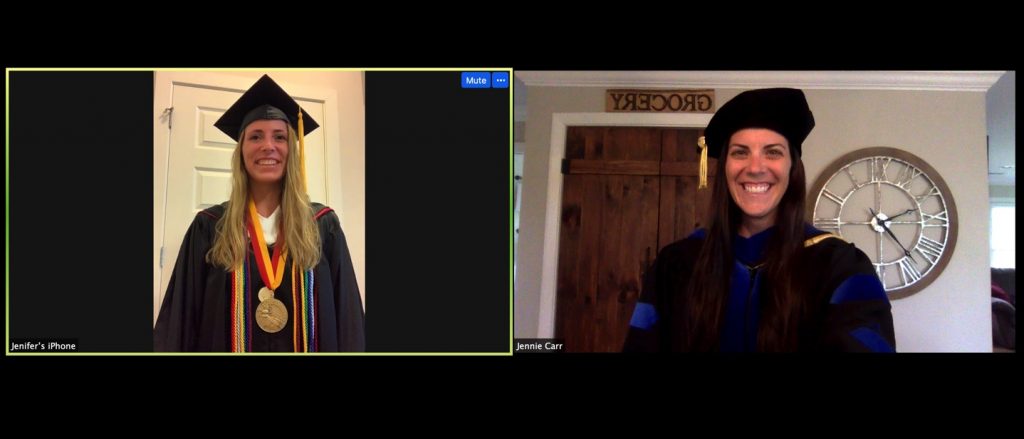By Jessica Luck
Throughout her 15-year teaching career, Associate Professor of Education Dr. Jennie Carr ‘05 has embraced technology in the classroom in a variety of forms, and has written numerous publications on the ways she has integrated digital resources into her teaching. But even with a solid background in the digital sphere, Carr was apprehensive at first about moving to a distance learning model during the spring semester. It didn’t take long—24 hours—before she had accepted the challenge and developed a strategy for adapting her classroom to a virtual reality.
During a Zoom call with her students Monday, March 16 (the first day of distance learning), Carr revealed her plan for syllabi changes and assignment adjustments, including simulcasting her lectures and moving her classes to an asynchronous, one-on-one format to provide the highest degree of flexibility for her students. She also made sure to listen to student feedback and concerns.
“It was really important for me to have them weigh in because this is a mutual experience,” she said.
During a normal semester, Carr uses a text app to communicate with her students. This practice became critical during distance learning, as Carr texted her students twice a week to send assignment reminders and to check in. Sometimes she received a simple thumbs up as a reply, but other times students asked to speak to her directly, so they could share how they were feeling. The asynchronous format also required an increased number of individual meetings so Carr could provide feedback on assignments and capstone projects.
“Care is the cornerstone of my teaching philosophy,” Carr said.
Because so many students, especially senior student teachers, were disappointed with the changes to the semester, Carr employed several ways of giving them a proper sendoff. For one, she dressed in her academic regalia and took graduation photos with seniors via Zoom. She also scheduled a “Desserts with Dr. Carr” event, in which her students signed on to Zoom one at a time to say goodbye. In addition, she used the virtual discussion board platform Flipgrid, so that seniors could record video messages to their classmates to share their future plans and favorite moments from their time at Bridgewater.
“Care is the cornerstone of my teaching philosophy.” — Associate Professor of Education Dr. Jennie Carr
“I wanted my students to feel like they got the chance to say goodbye,” she said. “That was really important to me.”
Going forward, Carr says being flexible is key. She plans to provide options for assignments for both in-person and distance learners, and says integrating alternative methods such as simulations and videos may need to be utilized to replace in-person student-teaching experiences.
“Virtual learning is likely to be commonplace within education for the foreseeable future, and so we’re going to need to train our teacher candidates to feel confident teaching in a remote environment,” Carr said. “No program has ever instructed on how to teach during a pandemic.”
When Assistant Professor of English Dr. Sam Hamilton got the news the College would be moving to distance learning for the rest of the spring semester, his initial concern was for his first-year students. Hamilton was teaching two sections of a first-year writing seminar, and he knew how critical it was for students with only one semester of college under their belt to remain connected to campus and each other.

When the 9/11 attacks occurred, Hamilton was a freshman at Indiana University of Pennsylvania, in Indiana County, Pa. Talking face-to-face with his peers helped him process his feelings about the life-altering event, and he was intent on helping to foster that connectedness among his students. For one, Hamilton moved all of his classes to an asynchronous format. Conversations with his students centered on classwork as well as the larger landscape of coping with the COVID-19 crisis. He also changed writing assignments to be more reflection-based instead of argument-based, to give students a chance to put their feelings about current events on paper. Hamilton completed each assignment alongside his students and shared his thoughts with them.
Hamilton, the director of the Master of Arts in Digital Media Strategy (MDMS) program, also allowed his students to break out of the traditional pen-and-paper mode and turn their assignments into podcasts, videos and any media format with which they were comfortable. Surprisingly, he said several students who were reluctant to share in a typical class environment were turning in 20-minute reflective videos.
“My students were sharing incredible things, which I was so thankful for,” Hamilton said. “They felt, in some ways, liberated to share things with me they wouldn’t have otherwise.”
The global pandemic in which the majority of people were working from home and communicating electronically served to underscore two of Bridgewater’s academic offerings, Hamilton said: the MDMS program and the professional writing major.
“The thing that has been underlined for me is the importance of the interdisciplinary work I do in both the professional writing program and the MDMS program and why students need to know how to write, because sometimes you might not be face-to-face with someone to explain what you mean,” he said. “Writing happens in myriad different mediums: It’s happening online, it’s happening in the scripting you do for a YouTube video or in an email.”
“One of the things I was thinking about was the importance of connection and how to remain connected and what that means. And I wanted to make sure my students knew I was thinking about them, because I was deeply concerned about their well-being.” — Assistant Professor of English Dr. Sam Hamilton
One of Hamilton’s own reflections during the spring semester was shared on the MDMS Instagram page. In it, Hamilton directly addressed his students on Day 12 of distance learning and told them how much he missed them, and commended them for their bravery, intelligence, thoughtfulness and resiliency.
His love letter to students ended with one of his oft-quoted references to Kurt Vonnegut’s Slaughterhouse-Five: “Be kind, babies.” Looking back, Hamilton said those words are perhaps even truer today than they were months ago.
“One of the things I was thinking about was the importance of connection and how to remain connected and what that means,” Hamilton said. “And I wanted to make sure my students knew I was thinking about them, because I was deeply concerned about their well-being.”
Screen team
During quarantine, Hamilton got to check something off his bucket list: Start a podcast. At first, Hamilton thought he’d create one centered on being an English professor but thought the content might not have a broad enough appeal. He realized that the prompts he asks his students before class, what he calls Attendance Questions (“Who would win in a fight: a T-Rex or an Abominable Snowman?” and “What’s your favorite album?”), would be the perfect icebreakers with his BC colleagues. The questions are what Hamilton calls “academic discourse light” and are designed to encourage people to adopt a stance and defend it.
During the month of May, Hamilton recorded 12 video interviews with BC faculty and staff via Zoom for his “vlogcast,” and he released one interview a week throughout the summer on his personal social media accounts.
The intention behind the interviews was to provide content to promote connections in the BC community during the time between the academic years. But Hamilton soon realized an unintended benefit: how much he and his colleagues were learning about each other.
“I feel more connected and closer to a lot of my colleagues than I did beforehand,” he said.


